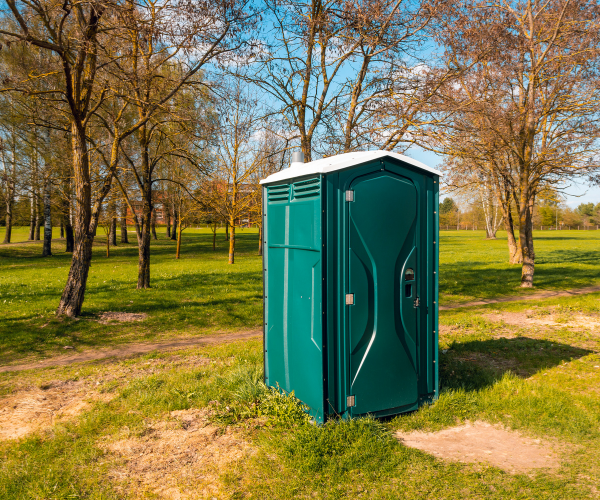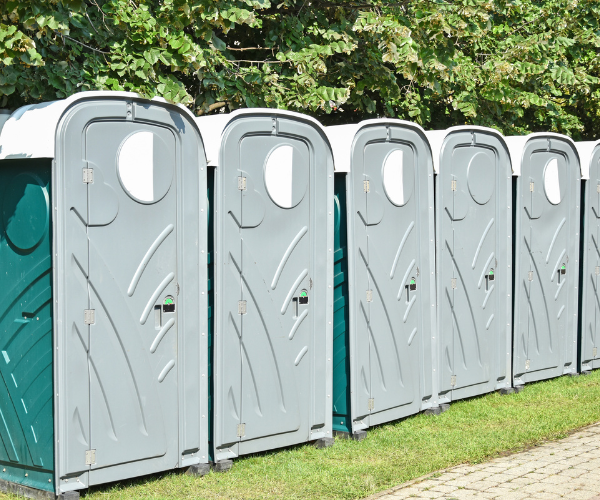Portable toilets have emerged as a sustainable option for many events and workplaces due to their eco-friendly design and functionality. One significant advantage is their water conservation compared to traditional restrooms. While standard flush toilets consume large quantities of water per use, portable toilets operate with minimal water, effectively reducing waste. Additionally, these units efficiently contain waste using specially designed holding tanks, enhancing waste management and limiting environmental contamination. Modern portable toilets often incorporate recyclable materials and use biodegradable chemicals for waste treatment, lessening their ecological impact. Their ease of transport allows for strategic placement, eliminating the need for permanent infrastructure at temporary sites, which enhances their environmental benefits. Typically equipped with hand sanitizers or wash stations, they promote hygiene without relying on excessive personal disinfectant use. By choosing portable toilets, users actively support sustainable practices that benefit both environmental health and personal convenience. The use of portable toilets in diverse settings symbolizes a growing awareness and commitment to sustainable living, making them appealing not only for their environmental benefits but also for their role in implementing resource-efficient practices across various venues.

Portable Toilet Rentals in Lake Lure, South Carolina
Call today for a free quote (864) 477-7907
Portable Toilet
Fast, Easy, & 100% Free To Get Started
Over 20 Years Of Experience
For more than 20 years, LittleJohn Toilets has forged strong community connections and earned a stellar reputation for quality service in Lake Lure. Our dedication to customer satisfaction showcases our role as a reliable, locally-focused provider.
Commitment to Quality Service
Our commitment to quality is evident in every aspect of our service. From clean units to timely delivery, we ensure our customers receive top-of-the-line portable sanitation solutions tailored to their specific needs.
Quick and Reliable Delivery
At LittleJohn Toilets, we prioritize prompt and dependable service. Our efficient team guarantees quick delivery of portable toilets, ensuring you never have to worry about delays when planning your events or projects.
Clean Portable Toilet Solutions in Lake Lure
Call for a Free Quote Today
(864) 477-7907
At LittleJohn Toilets, we pride ourselves on being a dependable and reliable provider of portable toilet services in Lake Lure, South Carolina. As a locally owned company, our commitment to quality service extends to Lake Lure and the surrounding areas, ensuring that your needs are met with top-notch solutions. Whether you're planning a large event like a festival or managing a busy construction site, we are well-equipped to deliver clean, well-maintained portable toilets. For weddings, parties, or corporate events, our top priority is your satisfaction with the convenience and reliability of our services. Our expert team is ready to provide support for all kinds of gatherings, guaranteeing hygienic facilities wherever they're required.


Our standard porta john rental units are durable and reliable for any commercial build site, housing development, public works project, or remodel job.Features include dome lighting, grated floors, and an “In-Use” locking mechanism for privacy and comfort. Regularly maintained, inspected, and cleaned by FusionSite at your location.

Developed as an alternative to full ADA-compliant restrooms, the Liberty is a spacious, wheelchair-accessible unit that can also be promoted as a family-sized restroom. Includes a patented flat-floor system for easy wheelchair access and maneuverability.Handrails, paper holder, and rotary latch are designed for simple, intuitive end-user operation.

Portable hand washing stations are essential for keeping your work site sanitary and clean. Features hands-free foot pumps, liquid soap, and paper towels.Perfect for job sites without water hookups, these units can handle hundreds of washes between services.
We Proudly Serve
Standard Portable Toilets
Our Standard Portable Toilets offer clean, convenient, and reliable solutions for events and projects in South Carolina.
High Rise Portable Toilets
High Rise Portable Toilets at Lake Lure are designed for easy accessibility and efficient use in diverse locations.
Restroom Trailers
Restroom Trailers from LittleJohn Toilets provide upscale, spacious facilities for events in Lake Lure.
Roll off Dumpsters
Roll off Dumpsters available at LittleJohn Toilets ensure efficient waste management for projects in Lake Lure.
Septic Tank Cleaning
Septic Tank Cleaning by LittleJohn Toilets offers thorough and professional servicing throughout South Carolina.
Grease Trap Cleaning
Grease Trap Cleaning services at Lake Lure keep your systems functioning smoothly with minimal disruption.
Fencing & Barricades
Fencing & Barricades from LittleJohn Toilets deliver quality temporary solutions for all project sizes in South Carolina.
Residential Storage
Our Residential Storage offers secure, flexible storage options for clients in Lake Lure, South Carolina.
Lake Lure Portable Toilet, Restroom Trailers, and More
Getting a quote and scheduling delivery for a portable toilet at LittleJohn Toilets is straightforward and convenient. We understand that time is of the essence when planning special events or managing ongoing projects, which is why we have streamlined our process to ensure quick access to our services. Begin by visiting our website, where you'll find clear instructions to request a quote for your specific requirements. Our user-friendly interface allows you to explore various options and select the units best suited for your needs. Once you've submitted an inquiry, our responsive team will promptly provide you with detailed information and pricing options tailored to your event or project scope. With clarity and transparency as priorities, we aim to deliver hassle-free quotes that make planning more intuitive. LittleJohn Toilets not only meets expectations with our simple quoting process but also ensures efficient delivery timed perfectly to your schedule. Our reliable logistics team prioritizes punctuality and professionalism, so your portable restroom facilities are ready when and where you need them. Trusted by countless clients throughout Lake Lure and beyond, we are committed to reliability and exceptional service, making your satisfaction our ultimate goal.

Nestled in the heart of Lake Lure, LittleJohn Toilets delivers premium portable toilet services with a distinctive local flair. Framed by the breathtaking views of Chimney Rock State Park and the vibrant atmosphere of the annual Lake Lure Arts & Crafts Festival, our solutions enhance every guest's experience. Be it a summer festival by the lake or a large family reunion, our portable toilets ensure top-notch comfort and convenience amidst the area’s natural beauty. We take pride in our established community reputation, consistently providing reliable service that reflects the charming character of Lake Lure. From sparkling clean units to their seamless integration with the region’s scenic vistas, our offerings address every event’s requirements. Trust us for exceptional hygiene and convenience that elevate gatherings and boost project efficiency in this lively locale. With LittleJohn Toilets, your portable sanitation needs are expertly managed.
Why are we the best choice in Lake Lure? Our dedication to providing clean, reliable, and convenient portable toilet services makes us stand out. Locally owned and operated, we understand the unique needs of the Lake Lure community and offer services that blend seamlessly into the scenic setting. Our expert team remains attentive to every detail, ensuring we exceed expectations with all service aspects. From intimate weddings to large events, our product and service offerings are diverse, catering to all needs and guaranteeing guest satisfaction. We remain a trusted choice for portable sanitation, thanks to our unwavering focus on quality, reliability, and exceptional customer service.
At LittleJohn Toilets, we understand the importance of fast, reliable service when it comes to portable toilet rentals. With a keen focus on efficiency, our logistics team ensures that units are delivered on schedule to support the success of your events or projects. Our process is tailored to meet the unique demands of our Lake Lure clientele, providing assurance that services are rendered promptly with attention to the highest quality standards. Whether for a wedding, festival, or construction site, our portable toilets arrive ready for immediate use, enabling a seamless experience. Depend on LittleJohn Toilets for services that are as consistent as they are reliable, bolstering convenience for every occasion. Experience the difference that our timely service can make, as we remain committed to exceeding the expectations of those we serve.
Learn More About Our Portable Toilets in Lake Lure
Renting a portable toilet in Lake Lure with LittleJohn Toilets is an easy and straightforward process. First, visit our website and navigate to the forms available at both the top and bottom of the page or simply click on the 'Get A Quote' buttons conveniently placed across various sections. Fill out the form with your first name, last name, phone number, and email address to initiate your rental process. Once submitted, a member of our dedicated team will contact you promptly for more details about your specific needs and provide you with customized rental options. Our expert staff is ready to assist you in selecting the ideal portable toilets for your event, be it a small gathering or large-scale function. Ensuring quick and efficient service, you can count on us to deliver cleanliness and reliability right to your venue. At LittleJohn Toilets, our goal is to make your rental experience seamless and stress-free, allowing you to enjoy peace of mind knowing that all sanitation needs are covered.
The delivery timeframe for portable toilet orders typically depends on the location and specific needs of your event or project. At LittleJohn Toilets, we aim to accommodate your schedule with prompt and efficient service. Generally, after confirming your order details, delivery can often be arranged within a business week, ensuring ample time for setup and preparation. During peak seasons or particularly busy periods, we recommend placing orders well in advance to guarantee the availability of your preferred units. Our logistics team works diligently to optimize delivery routes and schedules, minimizing wait times without compromising on service quality. Communication is key; keeping clients informed about timings and any potential changes ensures complete transparency and reliability. Whether for construction sites, festivals, or private events, trust us to deliver portable toilets precisely when needed, elevating the total experience with punctual and professional service. Ultimately, our commitment to timeliness reflects in every delivery, allowing clients to focus on achieving their event goals without logistical concerns.
Yes, absolutely. LittleJohn Toilets can service a wide range of events and construction sites, ensuring that all needs are met with the utmost professionalism. We cater to every kind of gathering, including festivals, sporting events, weddings, corporate functions, and family reunions, with portable sanitation solutions tailored for each occasion. Our extensive range of products includes luxury restroom trailers, porta potties, roll-off dumpsters, fencing and barricades, holding tanks, ADA units, portable sinks, and hand sanitizer stations. Whether your event is large or intimate, our team is ready to provide exemplary service to ensure everything runs smoothly. We also support construction projects of all sizes, ensuring that work teams have the facilities they need to remain productive and healthy. Our commitment to quality and flexibility ensures that no matter the event or job site, we can tailor our services to match, offering unparalleled convenience and satisfaction. Choose LittleJohn Toilets and experience the ease and assurance of working with a trusted provider for all portable sanitation needs.

